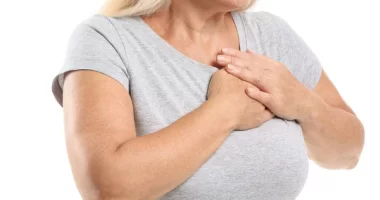For most women, menopause began in the late 40s or early 50s. So, it is very important for women in their 40s to eat well, exercise regularly, and maintain a healthy weight.
Menopause refers to women who have not had a period for twelve consecutive months. The average age of women entering menopause is 51, but it can be earlier or later than this age. For most women, menopause began in the late 40s or early 50s. Pre-menopausal symptoms usually lasts for several years. During this period, at least two-third of women will experience menopausal symptoms. Hot flashes, night sweats, mood swings, irritability, and tiredness are some of the symptoms. In addition, menopausal women have an increased risk of various diseases, such as osteoporosis, obesity, heart disease, and diabetes. So, it is very important for women approaching menopause to eat well, exercise regularly and maintain a healthy weight.
Below, Dr Teena Thomas, Consultant Obstetrician & Gynaecologist, Motherhood Hospitals, Sarjapur, Bangalore shares 10 steps women in their 40s should follow to approach a healthy menopause:
Also read: 13 health conditions including diseases you never knew beetroot could improve if not cure
Eat more foods rich in calcium and vitamin D
Hormonal changes during menopause can weaken bones and increase the risk of osteoporosis. Calcium and vitamin D are related to good bone health, so it is very important to get enough of these nutrients in your diet. Adequate vitamin D intake in postmenopausal women is also associated with a reduced risk of hip fractures due to weak bones. Many foods are high in calcium, including dairy products such as yogurt, milk, and cheese. Green leafy vegetables such as kale, cabbage, and spinach are also high in calcium. It is also rich in tofu, beans, sardines, and other foods.
In addition, calcium-fortified foods are also good sources, including certain cereals, fruit juices, or milk substitutes. Sunlight is the main source of vitamin D because it is produced by your skin in the sun. However, as you age, your skin becomes less effective. If you do not have much sun exposure or cover your skin, it may be important to take supplements or increase the source of vitamin D in your food. Rich dietary sources include oily fish, eggs, cod liver oil, and foods rich in vitamin D.
Achieve and maintain a healthy weight
Weight gain during menopause is common. This may be due to a combination of hormonal changes, aging, lifestyle, and genetic factors. An increase in excess body fat, especially the fat around the waist, will increase the risk of diseases such as heart disease and diabetes. In addition, your weight can affect menopausal symptoms.
Also read: Benefits of Cloves And How To Make Clove Tea
Exercise regularly
There is currently insufficient evidence to confirm whether exercise can effectively treat hot flashes and night sweats. But regular exercise is linked to improved energy and metabolism, healthier joints and bones, lower stress, and better sleep. For example, a study found that 3 hours of exercise per week for a year can improve the physical and mental health and overall quality of life of a group of menopausal women. Regular exercise is also associated with better health and prevention of diseases and conditions, including cancer, heart disease, stroke, high blood pressure, type 2 diabetes, obesity, and osteoporosis.
Consider Hormone Therapy (HT)
Hormone therapy is a way for many women to take care of themselves during menopause. HT injects hormones that are no longer produced in the body into the body. HT can relieve symptoms and help prevent osteoporosis. Not all women need HT, but many women have found relief. Hot flashes and sweating may be reduced, vaginal moisture increased, mood swings reduced, and fractures prevented. If you cannot control the symptoms of menopause, discuss HT with your doctor. You will decide together whether this option is right for you.
Stay hydrated
Drinking cold water helps regulate body temperature. If you haven’t started carrying reusable water bottles, now may be the time. Drinking plenty of water throughout the day is a good way to cool down the body and help it maintain a more balanced temperature. Drinking enough water throughout the day can help reduce hormonal swelling and replenish dry skin and tissues. Drink eight to twelve glasses of water a day to stay hydrated. Don’t forget to put a glass of cold water by the bed every night. Drinking water after waking up from night sweats can quickly relieve symptoms.
Eat more fruits and vegetables
A diet rich in fruits and vegetables can help prevent many menopausal symptoms. Fruits and vegetables are low in calories, which can help you feel full and are ideal for weight loss and maintenance. They also help prevent many diseases, including heart disease. This may be due to factors such as age, weight gain, or possible reduction in estrogen levels. Finally, fruits and vegetables also help prevent bone loss.
Avoid Trigger Foods
Certain foods can cause hot flashes, night sweats, and mood swings. When you eat them at night, they can provoke you more easily. Common triggers include caffeine, alcohol, and sugary or spicy foods. Record the symptoms in a diary. If you feel that certain foods can cause menopausal symptoms, try to cut back, or avoid them altogether.
Regular Gynae health check up
All women should be aware of the screening tests which are available. Regular Pap smears and ultrasound breast should be done. Regular checking of blood sugars, cholesterol, and blood pressure should be done.
Reduce your intake of refined sugar and processed foods
A diet high in refined carbohydrates and sugar can cause blood sugar spikes and drops, leaving you tired and irritable. In fact, one study discovered that high-refined-carbohydrate diets may increase the risk of depression in postmenopausal women.
Discuss supplements with your doctor
If you are interested in taking nutritional supplements for menopause or preventing health risks, please discuss them with your doctor. Some women use calcium or black cohosh, but these supplements are not suitable for everyone. It is important to talk with your doctor to learn more about the best options for your body.
This post first appeared on The Health Site







